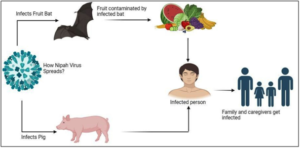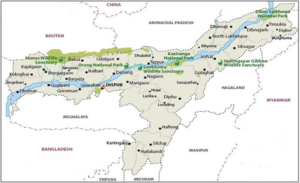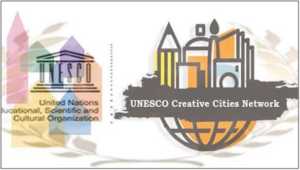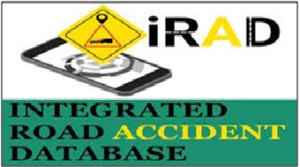Archives
(PRELIMS Focus)
Category: Science and Technology
Context:
- The Indian Council of Medical Research (ICMR) has invited Expression of Interest (EoI) from eligible organisations, companies, and manufacturers for the development and production of monoclonal antibodies (mAbs) against Nipah viral disease.

About Nipah Virus:
- Nature: Nipah virus (NiV) is a zoonotic virus (transmitted from animals to humans) and can also be transmitted through contaminated food or directly between people.
- Family: The organism that causes Nipah Virus encephalitis is an RNA or Ribonucleic acid virus of the family Paramyxoviridae, genus Henipavirus, and is closely related to Hendra virus.
- Genome structure: The NiV genome is a negative-sense single-stranded RNA. It generates structural proteins like N, P, M, F, G, and L.
- Global spread: Nipah virus was first recognized in 1998-99 during an outbreak among pig farmers in Malaysia. The traces of the virus have been identified in various countries like Cambodia, Ghana, and Thailand.
- First spread in India: In India, the first Nipah virus outbreak occurred in Siliguri, West Bengal, in the year 2001.
- Hosts: NiV initially appeared in domestic pigs, dogs, cats, goats, horses, and sheep.
- Transmission: It spreads through fruit bats (genus Pteropus). The virus is found in bat urine, faeces, saliva, and birthing fluids.
- Fatality: The case fatality rate ranges from 40% to 75%.
- Symptoms: It causes encephalitic syndrome in humans, presenting with fever, headache, drowsiness, disorientation, mental confusion, coma, and potentially death.
- Diagnosis: Its diagnosis can be established through real-time polymerase chain reaction (RT-PCR) from bodily fluids and antibody detection via enzyme-linked immunosorbent assay (ELISA).
- Prevention: Presently, there are no vaccines available for humans or animals. However, Ribavirin, an antiviral, may play a role in lowering mortality in patients with Nipah virus encephalitis.
Source:
Category: Environment and Ecology
Context:
- Conservationists, wildlife officials, academicians, and students have got together to push for the Ramsar site tag for Rowmari-Donduwa wetland complex, which is within the Laokhowa Wildlife Sanctuary.

About Laokhowa Wildlife Sanctuary:
- Location: It is located on the southern part of the Brahmaputra River in Nagaon District of Assam.
- Area: It covers an area of around 70.13 sq.km.
- Associated with Kaziranga tiger reserve: It was declared as a buffer zone of the Kaziranga Tiger Reserve in 2007 and became an integral part of the larger Laokhowa-Burachapori ecosystem.
- Encapsulated by human-dominated areas: It is a part of the Brahmaputra valley and the sanctuary is surrounded by human-dominated areas on all sides except for the north.
- Flora: Laokhowa is rich in flora, with diverse plant species including grasslands, tropical moist deciduous forests, and semi-evergreen forests.
- Fauna: Its main attraction is the Great Indian one horned Rhinocerous. Other animals found here are Indian royal Bengal tiger, elephant, Wild Boar, Civet Cat, Leopard Cat, Hog Deer, Asian water buffalo, about 200 species of birds, including the Bengal Florica, Leopard, Asiatic Buffalo, etc.
Source:
Category: History and Culture
Context:
- Lucknow has been declared a UNESCO ‘Creative City of Gastronomy’ during the 43rd Session of the UNESCO General Conference in Uzbekistan. The recognition celebrates the city’s centuries-old Awadhi cuisine and living food traditions.

About UNESCO Creative Cities Network (UCCN):
- Creation: It was created in 2004 to promote UNESCO’s goals of cultural diversity and strengthen resilience to threats such as climate change, rising inequality, and rapid urbanisation.
- Objective: It aims to promote cooperation among cities that have identified creativity as a strategic factor for sustainable urban development.
- Coverage: The network covers seven creative fields: crafts and folk arts, media arts, film, design, gastronomy, literature and music. The network is aimed at leveraging the creative, social, and economic potential of cultural industries.
- In sync with SDGs: It is in line with Sustainable Development Goal 11, which aims for Sustainable Cities and Communities.
- Involves participation of private sector: It allows member cities to recognise creativity as an essential component of urban development, notably through partnerships involving the public and private sectors and civil society.
- Formation of hubs of creativity: It envisages developing hubs of creativity, innovation and broadening opportunities for creators and professionals in the cultural sector.
- Indian Cities in the UCCN: Kozhikode (Literature), Gwalior (Music), Jaipur (Crafts and Folk Arts), Varanasi (Music), Chennai (Music), Mumbai (Film), Hyderabad (Gastronomy), Lucknow (Gastronomy), and Srinagar (Crafts and Folk Arts) are included in this list.
Source:
Category: Polity and Governance
Context:
- Indian Institute of Packaging (IIP), an autonomous body under the Ministry of Commerce and Industry (MoCI), opened its Bengaluru Centre recently.

About Indian Institute of Packaging (IIP):
- Nature: It is an autonomous body in the field of packaging and working under the administrative control of the Ministry of Commerce and Industry, Government of India.
- Establishment: It was established on 14th May, 1966, and the institute set up its first branch office at Chennai in 1971, followed by branches at Kolkata, Delhi, and Hyderabad in 1976, 1986, and 2006, respectively.
- Headquarters: Its headquarters and principal laboratories are located in Mumbai.
- Objective: The main objective of the Institute is to promote the export market by way of innovative package design and development as well as to upgrade the overall standards of packaging in the country.
- Activities involved: The Institute is involved in various activities like testing and evaluation of packaging materials and packages, consultancy services, and research & development related to packaging. Besides this, the Institute is involved in training and education in the field of packaging.
- Closely associated with export promotion councils: It imparts training in innovative and aesthetic packaging to the artisans, weavers, exporters, stakeholders, etc. It is closely working with various commodity boards and export promotion councils such as APEDA, Spices Board, MPEDA, Tea Board, MoFPI, and others.
- Member of various packaging federations: The Institute has linkages with international organisations and is a founding member of the Asian Packaging Federation (APF); a member of the Institute of Packaging Professionals (IOPP), USA; the Institute Packaging (IOP), UK; Technical Association of Pulp and Paper Industry (TAPPI), USA.
- Events: The Institute organizes a biannual event i.e. International Packaging Exhibition, i.e., INDIAPACK, and a national contest for excellence in packaging, i.e., INDIASTARA.
Source:
Category: Miscellaneous
Context:
- To prevent road accidents and fatalities, the Ministry of Road Transport and Highways (MoRTH) will soon release black spot data for 2023 and 2024 based on Integrated Road Accident Database (iRAD) system.

About Integrated Road Accident Database (iRAD) System:
- Nodal ministry: It is an initiative of the Ministry of Road Transport and Highways (MoRTH) and is funded by World Bank, to improve road safety in the country.
- Data for various stakeholders: This will facilitate road accident data collection by 4 stakeholder departments; Police, Transport, Highways and Health Departments.
- Identification of accident-prone areas: Through a collection of road accident data from all over the country, a road accident database will be developed. The collected data will be analysed using different data analytics techniques for the identification of accident-prone areas and the causes of the accidents.
- Unified strategy for road safety: The analysis output will be represented in appropriate dashboards, access to higher authorities of stakeholder departments and MoRTH. And accordingly, a strategy will be formed for the reduction of the number of road accidents in India and to enhance road safety.
- Working mechanism: The IRAD mobile application will enable police personnel to enter details about a road accident, along with photos and videos, following which a unique ID will be created for the incident. Subsequently, an engineer from the Public Works Department or the local body will receive an alert on his mobile device. He or she will then visit the accident site, examine it, and feed the required details, such as the road design.
Source:
(MAINS Focus)
(GS Paper 2: India and its Neighbourhood – Relations; International Relations and Diplomacy)
Context (Introduction)
India’s diplomatic dilemma post-Taliban’s return to power in 2021 revolves around whether to formally recognise the regime or merely engage with it. As Pakistan-Taliban tensions deepen, New Delhi recalibrates its Afghanistan policy towards conditional engagement rather than recognition.
Main Arguments
- Strategic Recalibration after 2021 – Following the Taliban’s return to Kabul, India faced the choice between isolation and engagement. It chose conditional engagement to safeguard its $3 billion investment and influence built over two decades.
- India’s Three Objectives – Protect past development gains, prevent Afghan soil from being used by anti-India groups, and keep the Taliban from acting as Pakistan’s geopolitical proxy.
- Conditional Diplomacy – Upgrading India’s mission in Kabul and resuming projects reflects a cautious attempt to test the Taliban’s autonomy while maintaining leverage.
- Regional Shifts – As Pakistan-Taliban relations worsen and major powers like Russia and China formalise ties, India’s engagement gains new geopolitical relevance.
- Caution over Recognition – While recognition could deepen cooperation, it would grant the Taliban long-sought legitimacy and weaken India’s moral and strategic influence to push for reform.
Criticisms and Concerns
- No Real Change in Ideology – The Taliban remain the same totalitarian force that emerged in the 1990s, showing no genuine ideological or social reform.
- Humanitarian and Economic Crisis – Afghanistan’s economy has contracted by a third; nearly half its population (22.9 million) requires humanitarian aid amid Taliban-enforced gender apartheid.
- Terror Links Persist – UN reports confirm Taliban ties with al-Qaeda, Lashkar-e-Taiba, and Jaish-e-Mohammad, all posing long-term security risks for India.
- Illusion of Stability – Despite relative calm, ethnic divisions and exclusionary Pashtun dominance make the regime’s consolidation fragile and potentially reversible.
- Legitimacy Dilemma – Recognising the Taliban would strengthen their global standing, prompting others to follow, and close off one of India’s few leverage points for pushing democratic reforms.
Suggested Approach / Reforms
- Engage, Don’t Endorse – Continue talks with the Taliban but refrain from recognition; use diplomatic presence to protect Indian interests.
- Humanitarian Assistance – Focus aid delivery through international agencies to reach Afghan citizens, not the regime.
- Multilateral Pressure – Work through the UN, SCO, and regional partners to demand respect for fundamental freedoms, especially of women.
- Strategic Patience – Adopt a long-term, measured policy; the Taliban need India more than India needs them.
- Link Assistance to Reforms – Tie any development cooperation to verifiable progress in inclusion, rights, and counterterrorism commitments.
Conclusion
Thus, India’s interests lie not in legitimising the Taliban but in influencing them. While the Taliban seek India’s help amid economic collapse and regional isolation, New Delhi should use this dependence to urge moderation and inclusion. Afghanistan’s stability, he stresses, will not emerge from the Taliban’s guns but from economic recovery, political inclusion, and regional cooperation.
Mains Question:
- “India’s approach to the Taliban tests its ability to reconcile moral diplomacy with geopolitical necessity.” Analyse. (150 words, 10 marks)
Source: The Hindu
(GS Paper 3: Infrastructure; Transport & Logistics; GS Paper 2: India in the World Economy)
Context (Introduction)
India’s shipping sector, long neglected under liberalisation, is now recognised as a strategic asset rather than merely a commercial one. With major investments and reforms announced at India Maritime Week 2025, India aims to rebuild shipping capability for trade resilience and maritime power.
Main Arguments
- Strategic Importance Beyond Trade – The article emphasises that shipping is “not just a business but a business with a strong strategic component.” Relying on foreign-owned vessels, India had reduced leverage over its own trade flows during the pandemic.
- Decline Under Previous Policy – For about two decades, under liberalisation, privatisation and globalisation, India reduced state support for its national shipping fleet (Shipping Corporation of India, SCI) and allowed competitive neutrality to overshadow strategic shipping interests.
- Government’s Renewed Push – The government has signalled a change: large investment commitments at India Maritime Week, fleet expansion plans for SCI, port infrastructure upgrades, connectivity enhancement and an emphasis on “Make in India” shipbuilding. For example, a planned fleet of 216 vessels by 2047 for SCI.
- Infrastructure and Port Development as Drivers – The article notes port-side investments dominate: landlord model ports attracting private/foreign capital, connectivity improvements, hub development (e.g., Andaman transshipment).
- Shipbuilding Lags but Aspiration High – The author points out that while ports and logistics are gaining momentum, Indian shipyards have yet to deliver advanced vessels (LNG or green-fuel ships) that would signal full industrial capability.
- Re-asserting Maritime Autonomy – The argument is that through domestic fleet growth and ship-registration incentives (foreign ships registering in India), India can reduce dependence on external shipping capacity and enhance strategic flexibility.
Criticisms and Drawbacks
- Past Policy Neglect – Two decades of relative neglect meant India’s merchant fleet share shrank and indigenous ship-building capacity stalled, reducing strategic resilience.
- Shipbuilding Gap – Despite ambitious targets, actual global-scale shipbuilding and heavy-industry capability are still limited. Without strong shipyard performance, fleet expansion may remain aspirational.
- Financing & Execution Risks – Large investment pledges (e.g., ₹12 lakh crore at IMW 2025) are impressive, but translating MoUs into productive capacity, especially in heavy shipping segments, is complex.
- Global Headwinds & Competition – The shipping industry is cyclical and global; India must compete with established ship-owners, yards and flag states. Strategic ambition must meet commercial viability.
- Integration Challenges – Strengthening fleet and ports must go hand-in-hand with logistics, inland waterways, connectivity, human capital and regulatory reforms. Fragmentation could undermine gains.
- Sustainability and Technology Transition – As industry moves to green fuels, LNG, automation and digitalisation, India must ensure its ship-yards and shipping firms keep pace; failing to do so risks obsolescence.
Reforms and Strategic Recommendations
- Revive National Fleet with Strategic Mandate – Reinforce the Shipping Corporation of India and other state-actors with policy support: first-rights, strategic cargo assignment where national interest is at stake, while ensuring commercial viability.
- Boost Indigenous Shipbuilding Ecosystem – Support shipyards via attractive orders (especially for green-fuel vessels), cluster development, linking to Make in India, and financing mechanisms for long-term contracts.
- Enhance Port-Logistics Connectivity – Expand port capacity, modernise operations, monetise land, develop transshipment hubs (e.g., Andaman), improve connectivity (rail, road, inland waterways) under programmes like Sagarmala Programme.
- Leverage Flag Registration & Shipping Finance – Encourage foreign shipping companies to register vessels in India via subsidiaries to bring tonnage under national regulatory ambit; set up maritime-dedicated financing (NBFCs, funds) to support shipping assets.
- Regulatory & Legislative Modernisation – Replace archaic shipping and port laws: new legislation (Merchant Shipping Act 2025) to streamline fleet registration, safety, ship-finance and ship-ownership transparency.
- Green & Tech-Ready Shipping – Push for eco-friendly tugs, LNG vessels, alternative fuels (ammonia, hydrogen), digital port operations and smart logistics; this will future-proof India’s maritime industry.
- Human Capital & Sectoral Linkages – Expand seafarer training, maritime management education, R&D in ship-design; link shipping to insurance, repair yards, supply-chain services, and inland waterways for full ecosystem development.
- Strategic Outlook & Global Integration – View shipping and ports not only as trade enablers, but as instruments of geopolitical strategy: resilient supply-chains amid disruptions, blue-economy leadership, maritime partnerships and corridor-connectivity (India–Middle East–Europe, North-South).
Conclusion
- India stands at a pivotal moment in its maritime journey. The resurgence of interest—from ports and infrastructure to fleet growth—signals a recognition that shipping is not merely commerce but a cornerstone of trade resilience, industrial capability and geo-strategic autonomy.
- However, ambition must be matched by execution: reviving a national fleet, building advanced ship-yards, aligning financing and regulatory frameworks, and embracing green-tech and connectivity will determine whether India sails ahead or remains adrift.
- The task now is not just to invest in ships and ports but to orchestrate a maritime ecosystem that sustains India’s trade, industry and strategic interests for decades to come.
Mains Question
- India’s shipping sector must be developed not only for economic growth but also for strategic autonomy. Discuss in light of recent government initiatives such as the India Maritime Vision 2047.(250words, 15 marks)
Source: The Hindu
